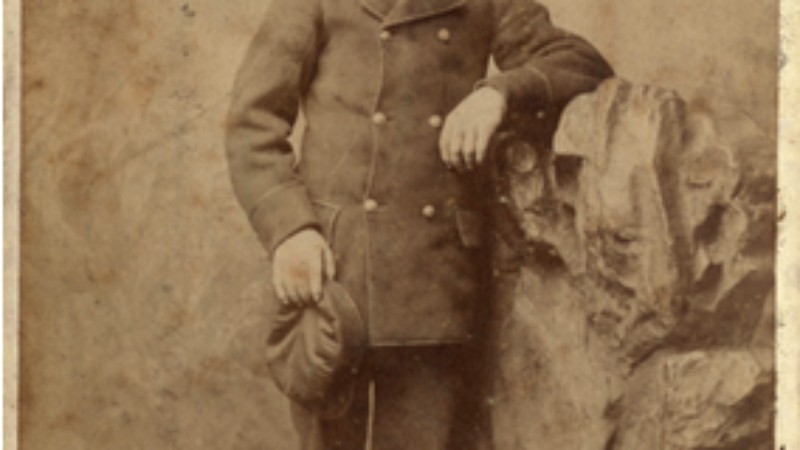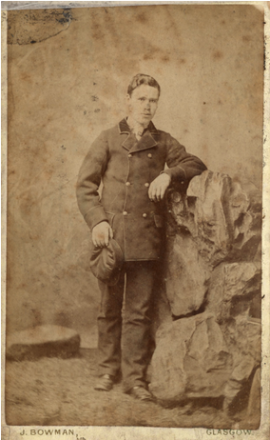
To commemorate the 100th anniversary of the passing of Labour’s first leader Keir Hardie today, LabourList is publishing a series of Hardie’s writings, introduced by Blair McDougall.

While he had some idyllic early memories of growing up in countryside around Lanarkshire, Keir Hardie later wrote that his upbringing was so hard that he never really knew childhood. First the stigma of being child of single mother in a small 19th century village, then adopted by his mother’s new husband who would call him a bastard when drunk. When children today would have been in the first years of primary school, he was working in the shipyards where he saw another boy fall to his death. Later, from the age of ten, he worked in the mines, often alone for hours at a time in the dark.
There follows two articles written by Hardie which give a flavour of the upbringing which did so much to shape his principles. The first, telling a story from when Hardie was just 10 years old, helps explain Hardie’s bitter hatred of hypocrisy and his efforts throughout his life to expose those who proclaimed themselves Christian while exploiting the poor. In the second we see something of Hardie the miner, but as a child labourer, as he describes just one of the occasions when he escaped death.
From Merthyr Pioneer, 2nd January, 1915
It was the last week in the year. Father had been away two or three days in search of work. Toward the end of the week, having been up most of the night, I got to the shop fifteen minutes late, and was told by the young lady in charge that if that occurred again I would be “punished.” I made no reply. I couldn’t. I made no reply. I couldn’t. I felt like crying. Next morning the same thing happened — I could tell why, but that is neither here nor there. It was a very wet morning, and when I reached the shop I was drenched to the skin, barefooted and hungry. There had not even been a crust of bread in the house that morning.
But that was pay-day and I was filled with hope. “You are wanted up-stairs by the master,” said the girl behind the counter, and my heart almost stopped beating. Outside the dining room door a servant bade me wait till “master had finished his prayers.” (He was much noted for his piety.) At length the girl opened the door, and the sight of that room is fresh in my memory even as I write, nearly fifty years after. Round the great mahogany table sat the members of the family, with the father at the top. In front of him was a very wonderful looking coffee boiler, in the great glass bowl of which the coffee was bubbling. The table was loaded with dainties. My master looked at me over his glasses and said in quite a pleasant tone of voice, “Boy, this is the second morning you have been late, and my customers leave me if they are kept waiting for their hot breakfast rolls. I therefore dismiss you, and, to make you more careful in the future, I have decided to fine you a week’s wages. And now you may go!”
I wanted to speak and explain about my home and I muttered out something to explain why I was late, but the servant took me by the arm and led me downstairs. As I passed through the shop the girl in charge gave me a roll and said a kind word.
Out in the rain I wandered round the streets most of the day. I knew my mother was waiting for my wages. As the afternoon was drawing to a close I ventured home and told her what had happened. It seemed to be the last blow. The roll was still under my vest, but soaked with rain. That night the baby was born, and the sun rose on the first of January, 1867, over a home in which there was neither fire nor food, though, fortunately, relief came before the day had reached its noon. But the memory of those early days abides with me, and makes me doubt the sincerity of those who make pretence in their prayers. For such things still abound in our midst.
From The Labour Leader, 26th March 1898
For several years as a lad I rarely saw daylight during the winter months. Down the pit by six in the morning, and not leaving it again until half-past five meant not seeing the sun, and even on Sunday I had at that time to spend four hours down below. Such an experience does not develop the sunny side of one’s being. But the Muirkirk accident [where 3 miners drowned underground] set my mind back to an incident of the long ago.
I would be about twelve at the time, and was a pony driver. We were working at nights, and some thirty men were employed, I being the only boy. It was dreary work. The pit was very old and very wet. To this day the dreary, monotonous drip, drip, drip of the water on every side is quite fresh in my ears.
My pony was a little shaggy Highlander, appropriately named Donald — strong and obstinate, like the race among whom he had been reared. We were great friends, and drank cold tea from the same tin flask, sip about. I have to confess that betimes his old reiving propensities overcame his loyalty, and on these occasions, should opportunity offer, he would steal the tea -flask from where it was kept, extract the cork, and empty it of its contents with , I doubt not, all the satisfaction which stolen sweets never failed to afford.
One night, just after midnight hour, when the weird noises of the pit are always at their height, Donald and I were jogging along, when the voice of Rab Mair, the big, genial fireman, came reverberating out of the gloom, his little lamp shining like a star in the blackness. “Run into the dock and warn the men to come at once; the shank’s closin”. I did not stay on the order of my going The shank closing! The shank is the shaft by which entrance and egress to the pit is obtained. It was the only outlet. Should it close in we were entombed, and what that might mean I did not care to think.
In a very short time all the men were at the pit bottom, only to find that already they were too late. We were seventy fathoms from the daisies, and the weary rocks, tired of hanging in mid-air, seemed bent on settling down into some semblance of solidarity. For once in a way the drip of water could not be heard. The timber props were creaking and bursting all around us; whilst the strong rocks were groaning and cracking and roaring as they were settling down. As man after man rushed to the bottom, breathless and alarmed, they were met with the news that already the cage by which men and material are taken to the surface, was “stuck in the shank”. The sides of the shaft had come together so far that the cage had no longer a free passage and was held fast some fathoms above us. We were prisoners.
I can recall every detail of the scene. The men gathered in groups, each with his little lamp on his bonnet, their blackened faces serious, discussing what should be done. The roaring and crackling, as if of artillery, went on overhead, and gloom began to settle on every countenance. Some of the most susceptible were crying, and I remember two by themselves who were praying and crossing themselves. Rab Mair remained cool and strong, and did his best to keep up the spirits of his fellow-prisoners.
By and by I began to feel sleepy, and made my way to the stables whither Donald had already gone. By this time it was evident the worst of the crisis was over; the noise overhead was subsiding and the drip of water was again to be heard. But the shaft was closed. We were prisoners indeed. After cleaning Donald down I gave him a feed of corn, put some hay in his manger and, rolling myself in this, kissed him, as was our wont, and then went off to sleep. A boy of twelve will sleep when there is nothing to do, even if he be cooped in a trap. How long I slept I have no means now of knowing. It was Rob Mair’s voice — swearing, if the truth must be told — and some vigorous punches from his fist which brought me back to consciousness.
The engineman, on finding the cages stuck fast in the shaft, and hearing the signals below, knew there was something wrong, and raised the alarm. In a short time the news spread, and soon the bulk of the people were at the pit, my mother among the rest. Volunteers were plentiful, and soon some brave fellows had been lowered by an improvised kettle into the shaft, where they soon discovered what was amiss. Cold chisels, picks and saws were requisitioned, and the imprisoned cage cut free and allowed to drop in pieces to the bottom, after which the kettle — a bucket used by pit sinkers, and narrower than the cage —was used to bring the imprisoned men to the surface.
But where was the trapper? Everyone had seen him in the bottom, and perhaps in the excitement of the moment no one would have missed him had there not been a mother there waiting for him. And so Rab Mair and two companions had to descend into the depths again and search. For a time their searching was in vain, until Rab bethought him of Donald’s crib, and there sure enough I was, sound asleep. Rab pretended to be angry — but he wasn’t. I think the reception on the top was the most trying part of the affair. At least, it was the only part where I cried.




More from LabourList
‘Labour is being badly misled on housing’
Reeves bets on patience over populism
‘Energy efficiency changes must work for older private renters’